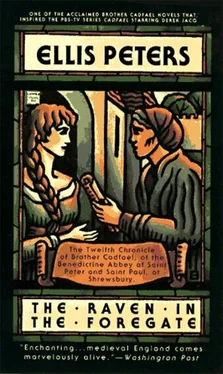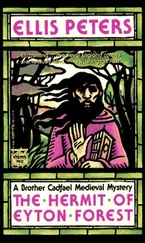“I went towards the place,” said Cynric, “and looked into the water. It was only then I knew him certainly for Ailnoth. He drifted at my feet, stunned or dazed… I knew his face. His eyes were open… And I turned my back and walked away from him, as he turned his back on her and walked away from her, shutting the door on her tears as he struck at this other woman’s tears… If God had willed him to live, he would have lived. Why else should it happen there, in that very place? And who am I, to usurp the privilege of God?”
All this he delivered in the same reasonable voice with which he would have rendered account of the number of candles bought for the parish altar, though the words came slowly and with effort and thought, studying to make all plain now that plainness was needed. But to Abbot Radulfus it had some distant echo of the voice of prophecy. Even if the man had wished to save, could he have saved? Might not the priest have been already past saving? And there in the dark, alone, with no time to summon help, since everyone was preparing for the night office, and with that undercut bank to contend with, and the dead weight of a big man to handle could any man, singly, have saved? Better to suppose that the thing had been impossible, and accept what to Cynric was the will of God!
“And now, with your leave, my lord abbot,” said Cynric, having waited courteously but vainly for some comment or question, “if you’ve no more need of me I’ll be getting on with filling in the grave, for I’ll need the most of the daylight to make a good job of it.”
“Do so,” said the abbot, and looked at him for a moment, eye to eye, with no shadow of blame, and saw no shadow of doubt. “Do so, and come to me for your fee when it is done.”
Cynric went as he had come, back to his work, and those who watched him in awe-stricken silence saw no change in his long-legged walk, or in the quiet, steady rhythm with which he plied his spade.
Radulfus looked at Hugh, and then to Jordan Achard, mute and wilting with relief from terror between his guards. For a brief instant the abbot’s austere face was shaken by the merest fleeting shadow of a smile. “My lord sheriff, I think your charge against this man is already answered. What other offences he may have on his conscience,” said the abbot, fixing the demoralised Jordan with a severe eye, “I recommend him to bring to confession. And to avoid henceforward! He may well reflect on the dangers into which such a manner of life has led him, and take this day as a warning.”
“For my part, I’m glad to know the truth and find that none of us here has the guilt of murder on his soul,” said Hugh. “Master Achard, take yourself home and be glad you have a loyal and dutiful wife. Lucky for you there was one here to speak for you, for there was a strong case against you had there been no such witness. Loose him!” he said to his sergeants. “Let him be about his business. By rights he owes a gift to the parish altar, by way of thanks for a good deliverance.”
Jordan all but sagged to the ground when the two officers took their hands from him, and Will Warden was moved in good humour to lend him a supporting hand again under one arm until he got his legs to stand solid under him. And now at last it was truly over, but that every soul there was so petrified with wonder that it took another benediction by way of dismissal to start them moving.
“Go now, good people,” said the abbot, somewhat brusquely accepting the need. “Make your prayers for the soul of Father Ailnoth, and bear in mind that our neighbour’s failings should but make us mindful rather of our own. Go, and trust to us who have the grant of this parish to bestow, to consider your needs above all in whatever we determine.” And he blessed them departing, with a vigour and brevity that actually set them in motion. Silent as yet, even as they melted like snow and began to move away, but soon they would be voluble enough. Town and Foregate would ring with the many and contradictory accounts of this morning’s events, to be transmuted at last into myth, a folk memory of momentous things witnessed, once, long ago.
“And you, brothers,” said Radulfus shortly, turning to his own flock, doves with fluttered feathers now and disrupted cooing, “go now to your daily duties, and make ready for dinner.”
They broke ranks almost fearfully, and drifted apart as the rest were doing, apparently aimlessly at first, then making slowly for the places where now they should be. Like sparks from a fire, or dust scattered on a wind, they disseminated, still half-dazed with revelation. The only one who went about his business with purpose and method was Cynric, busy with his spade under the wall.
Brother Jerome, deeply disturbed by proceedings which in no way fitted in with his conception of the rule and routine of the Benedictine order, went about rounding up some of his strayed chicks towards the lavatorium and the frater, and shooing some of the lingering parishioners out of the abbey’s confines. In so doing he drew near to the wide-open doors upon the Foregate, and became aware of a young man standing in the street outside, holding the bridle of a horse, and casting an occasional brief glance over those emerging, but from within a close-drawn capuchon, so that his face was not clearly visible. But there was something about him that held Jerome’s sharp eyes. Something not quite recognised, since the coat and capuchon were strange, and the face obstinately averted, and yet something reminiscent of a certain young fellow known for a while to the brethren, and later vanished in strange circumstances. If only the fellow would once turn his face fully!
Cadfael, lingering to watch Sanan and Diota depart, saw them instead draw back into the shadow of the chapel wall, and wait there until the greater part of the throng had moved towards the Foregate. The impulse came from Sanan, he saw her restraining hand laid upon the older woman’s arm, and wondered why she should delay. Had she seen someone among the crowd whom she was anxious not to encounter? In search of such a person, he scanned the retreating backs, and saw one at least whose presence there would certainly not be too welcome to her. And had she not, like Diota, drawn the hood of her cloak closely round her face, during the time that Cadfael himself had been absent, as if to avoid being noticed and recognised by someone?
Now the two women began to move after the rest, but with cautious slowness, and Sanan’s eyes were intent upon the back of the tall man who had almost reached the open doorway. Thus both Sanan and Cadfael at the same moment also saw Brother Jerome, hovering hesitant for a moment, and then making purposefully for the street. And following the converging courses of these two very dissimilar backs, the one erect and confident, the other meagre and stooped, inevitably lighted upon the horse waiting in the Foregate, and the young man holding his bridle.
Brother Jerome was still not quite sure, though he was bent on making sure, even if it meant leaving the precinct without due reason or permission. It would be counted due reason enough if he succeeded in raising a righteous alarm, and handing over a fugitive enemy of the King to the King’s justice. A guard outside the gates, the sheriff had said. He had but to halloo the soldiers on to their quarry, who stood within arm’s reach, believing himself safe. If, of course, if this really was the youngster once known as Benet?
But if Jerome was not yet certain, Sanan was, and Cadfael was. Who, in these parts, had known that figure and stance and carriage as well as they? And there was Jerome bearing down upon him with plainly malevolent intent, before their eyes, and they had no way of preventing the disaster.
Sanan dropped Diota’s arm and started forward. Cadfael, approaching from another angle, bellowed: “Brother!” peremptorily after Jerome, in a self-righteous and scandalised voice of which Jerome himself need not have been ashamed, in the hope of diverting his attention, but vainly. Jerome nose-down on the trail of a malefactor was almost as undeflectable as Father Ailnoth himself. It was left to someone else to turn the trick.
Читать дальше












